|
|
|
Sort Order |
|
|
|
Items / Page
|
|
|
|
|
|
|
| Srl | Item |
| 1 |
ID:
132983
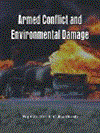

|
|
|
|
|
| Publication |
New Delhi, Vij Books India Pvt Ltd, 2014.
|
| Description |
xii, 362p.Hbk
|
| Standard Number |
9789382652779
|
|
|
|
|
|
|
|
|
|
|
|
Copies: C:1/I:0,R:0,Q:0
Circulation
| Accession# | Call# | Current Location | Status | Policy | Location |
| 057850 | 355.02/JHA 057850 | Main | On Shelf | General | |
|
|
|
|
| 2 |
ID:
177876
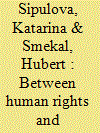

|
|
|
|
|
| Summary/Abstract |
The essay sheds light on the role of constitutional courts in transitional justice, focusing on their role in mitigating the conflicts between transitional justice and international human rights commitments. Through a study of the Czech Constitutional Court’s case law, we demonstrate that international human rights work both as a constraint and a tool. Constitutional courts use international human rights law selectively, when it suits their reasoning and views on transition. Nevertheless, the influence of international human rights law strengthens over time, especially when supported by the adverse rulings of international bodies, and gradually prevails over transitional justice justifications.
|
|
|
|
|
|
|
|
|
|
|
|
|
|
|
|
| 3 |
ID:
115592


|
|
|
| 4 |
ID:
117961
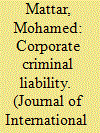

|
|
|
|
|
| Publication |
2012.
|
| Summary/Abstract |
The UN Convention against Transnational Organized Crime (UNCTOC) establishes criminal liability of the corporation as a legal entity in addition to the individual liability of persons who may be acting on behalf of the corporation. The purpose of this article is to address corporate criminal liability for illicit business practices that may be committed by a corporation in violation of international human rights law. This article will discuss corporate criminal liability under international conventional law and will discuss the extent to which U.S. domestic laws recognize corporate criminal liability. The article will highlight new trends in international law related to corporate liability, as well as instances where the legitimacy of corporate liability has been legally denied. Using Article 10 and domestic precedent, this article will argue that the role corporations play in international trade and development warrants their accountability and responsibility once they are involved in illicit business practices.
|
|
|
|
|
|
|
|
|
|
|
|
|
|
|
|
| 5 |
ID:
102582


|
|
|
|
|
| Publication |
2011.
|
| Summary/Abstract |
In this contribution, we consider the relevance of international human rights law to climate change. We review the widely agreed understanding that climate change interferes with human rights. We then examine how a particular State or States may be held responsible for internationally wrongful acts that are caused by contributions to climate change emanating from activities that are under that State's or those States' jurisdiction. We focus on human beings' actions that the best available science indicates with a high degree of certainty are responsible for climate change and the consequential interference with the human rights of individuals that are caused by the adverse impacts of climate change. We also explore the consequences of international human rights law for States' responsibility to cooperate to achieve adequate international action on climate change.
|
|
|
|
|
|
|
|
|
|
|
|
|
|
|
|
| 6 |
ID:
122439
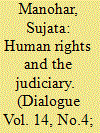

|
|
|
|
|
| Publication |
2013.
|
| Summary/Abstract |
1. Justice Louise Arbor, the former UN Commissioner for Human Rights
in her address at the opening of 61
st
session of the Commission on
Human Rights emphasized the role of the Judiciary in the enforcement
of Human Rights. She said, "Courts the world over have been playing
an increasingly vital role in enforcing social and economic rights,
bringing them from the realms of charity to the reach of justice, linking
them and developing a body of ever-growing jurisprudence by which
we can be guided in bringing these vital rights to the reality of peoples'
lives". In order to understand the impact of international law, and in
particular, international human rights law on judicial decision-making,
one needs to look at the ways in which public international law has
affected decision-making in several jurisdictions around the world.
|
|
|
|
|
|
|
|
|
|
|
|
|
|
|
|
| 7 |
ID:
124931
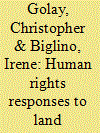

|
|
|
|
|
| Publication |
2013.
|
| Summary/Abstract |
This article approaches the debate on 'contemporary land grabbing' from a human rights perspective, focusing on one right that is particularly threatened: the right to food. It sketches an analytical framework grounded in international human rights law and the contribution such a framework can bring to the land-grabbing debate. Following a brief historical background on the right to food and its articulation in international human rights law, the paper expands on this by focusing on what can be called human rights responses to land grabbing from a right to food standpoint. The analysis considers the contributions of different actors in the human rights sphere and examines the role of the UN Committee on World Food Security and its recently adopted Voluntary Guidelines on the responsible governance of tenure of land, fisheries and forests. It also investigates how the phenomenon has been addressed by the UN human rights mechanisms, drawing on relevant practice of the UN treaty bodies and the Human Rights Council, with a focus on the Special Rapporteur on the right to food and the Special Rapporteur on the human rights situation in Cambodia. The engagement of regional human rights system with the issue of large-scale land transactions is also analysed.
|
|
|
|
|
|
|
|
|
|
|
|
|
|
|
|
| 8 |
ID:
078637


|
|
|
|
|
| Publication |
2007.
|
| Summary/Abstract |
International human rights treaties have been ratified by many nation-states, including those ruled by repressive governments, raising hopes for better practices in many corners of the world. Evidence increasingly suggests, however, that human rights laws are most effective in stable or consolidating democracies or in states with strong civil society activism. If so, treaties may be failing to make a difference in those states most in need of reform — the world's worst abusers — even though they have been the targets of the human rights regime from the very beginning. The authors address this question of compliance by focusing on the behavior of repressive states in particular. Through a series of cross-national analyses on the impact of two key human rights treaties, the article demonstrates that (1) governments, including repressive ones, frequently make legal commitments to human rights treaties, subscribing to recognized norms of protection and creating opportunities for socialization and capacity-building necessary for lasting reforms; (2) these commitments mostly have no effects on the world's most terrible repressors even long into the future; (3) recent findings that treaty effectiveness is conditional on democracy and civil society do not explain the behavior of the world's most abusive governments; and (4) realistic institutional reforms will probably not help to solve this problem
|
|
|
|
|
|
|
|
|
|
|
|
|
|
|
|
| 9 |
ID:
185659


|
|
|
|
|
| Summary/Abstract |
In this article, the authors highlight the need for refugee legislation in India while India celebrates its 75 years of independence. India should have domestic legislation to uniformise legal and conceptual understanding of refugees, to uniformise the procedural standards for all refugees without discrimination, to address the increasing influx of refugees due to increase in conflicts in the neighbouring geography such as Afghanistan and Myanmar and due to increasing threats of sea-level rise and de-territorialisation.
|
|
|
|
|
|
|
|
|
|
|
|
|
|
|
|
| 10 |
ID:
167834


|
|
|
|
|
| Summary/Abstract |
Past studies suggest that domestic public support for compliance with international human rights law can constrain governments to comply with human rights law. But the question remains: Why does the public care about compliance? Using a series of survey experiments in South Korea and the United States, this study finds that constituents are concerned about compliance in one issue area—such as human rights—because they believe it will affect the country's reputation in other domains of international law. Cross-national survey experiments demonstrate that past noncompliance negatively affects the South Korean public's second-order beliefs about the likelihood of future compliance across different issue areas. However, past noncompliance has a limited impact on the US public's first-order beliefs across different domains.
|
|
|
|
|
|
|
|
|
|
|
|
|
|
|
|
| 11 |
ID:
075711
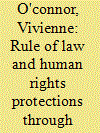

|
|
|
|
|
| Publication |
2006.
|
| Summary/Abstract |
This article examines the inter-relationship between the rule of law, criminal law reform and international human rights norms and standards in post-conflict societies from a theoretical as well as a practical perspective. In several peace operations, both national and international actors have faced significant challenges in reforming the domestic criminal law framework. Reflecting upon these challenges, many practitioners have called for the creation of 'law reform tools'. With the aim of providing such tools, the Model Codes for Post-conflict Criminal Justice Project has developed a set of model criminal laws. The model codes have been drafted in a manner that is fully compliant with international human rights norms and standards in the field of criminal proceedings. The article discusses how such model codes may meaningfully contribute to domestic criminal law reform efforts, not as a panacea but a start for enhanced human rights protection in post-conflict states.
|
|
|
|
|
|
|
|
|
|
|
|
|
|
|
|
| 12 |
ID:
110909


|
|
|
|
|
| Publication |
2012.
|
| Summary/Abstract |
On 2 May 2011, a team of US Special Forces executed an operation against Osama Bin Laden in Pakistan. The extraterritorial use of force against a non-State actor in the territory of another State with the aim of using lethal force against an individual is recognized as the phenomenon of targeted killings. Such operations exist on two levels: the extraterritorial use of force in the territory of another State and the use of lethal force against an individual. However, such operations also appear to blur and challenge boundaries within the international legal framework. This paper aims to clarify the existing rules within international law which govern targeted killings. The operation against Bin Laden will be used as a study to facilitate understanding of the legal considerations which arise in assessing the prohibition and permissibility of Targeted Killings under the existing framework of international law. This paper will examine the official US position under international law on targeted killings and the operation against Bin Laden to identify the legal justifications put forward. The paper will then continue to examine these legal justifications under existing frameworks in international law from three legal regimes which come into play: (i) jus ad bellum; (ii) jus in bello; (iii) International Human Rights Law.
|
|
|
|
|
|
|
|
|
|
|
|
|
|
|
|
| 13 |
ID:
173804
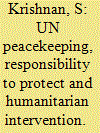

|
|
|
|
|
| Summary/Abstract |
The question of armed intervention on behalf of the international community, in the internal affairs of a state against the wishes of the government of that state, in order to prevent widespread death or suffering among the population, is not a new one. Indeed Imperial Rome grappled with the same problems in Dalmatia and Judaea 2,000 years ago, as the international community does in those same regions today. How effective are peacekeeping operations in preventing and stopping violence? Is there an alternative to United Nations (UN) and regional peacekeeping operations? The practice of UN peacekeeping is evolving in many instances into robust peacemaking actions with a positive responsibility to protect (R2P) civilians within the field of operations. The R2P (and ‘responsibility while protecting’ (RwP)) concept sets out a key principle to enable the international community to prevent atrocity crimes. Since its emergence, however, there have been intense discussions over how to put the principle into practice. Some aspects of the concept remainf unclear, including how to undertake, as the last resort, the use of military force. These issues must be considered within the boundaries set by R2P which seek at all costs to avoid the use of force for other reasons than ceasing mass atrocity crimes. The use of force, therefore – including possible military action by the international community, given growing international reluctance to accept grave threats to peace and security, including mass crimes against defenceless populations – has to be thoroughly analysed and comprehended. This article presents an analysis of the development of civilian peacekeeping, its relevance in the field of conflict resolution and its autonomy from multidimensional peacekeeping, championed by the UN.
|
|
|
|
|
|
|
|
|
|
|
|
|
|
|
|
| 14 |
ID:
108484


|
|
|
|
|
| Publication |
2011.
|
| Summary/Abstract |
A concern with ensuring minimum standards of dignity for all and a doctrine based on the need to secure for everyone basic levels of rights have traditionally shaped the way in which international human rights law addresses poverty. Whether this minimalist, non-relational approach befits international law objectives in the area of world poverty begs consideration. This article offers three justifications as to why global material inequality - and not just poverty - should matter to international human rights law. The article then situates requirements regarding the improvement of living conditions, a system of equitable distribution in the case of hunger, and in particular obligations of international cooperation, within the post-1945 international effort at people-centred development. The contextual consideration of relevant tenets serves to demonstrate that positive international human rights law can be applied beyond efforts at poverty alleviation to accommodate a doctrine of fair global distribution.
|
|
|
|
|
|
|
|
|
|
|
|
|
|
|
|
| 15 |
ID:
130777
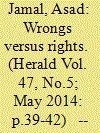

|
|
|
|
|
|
|
|